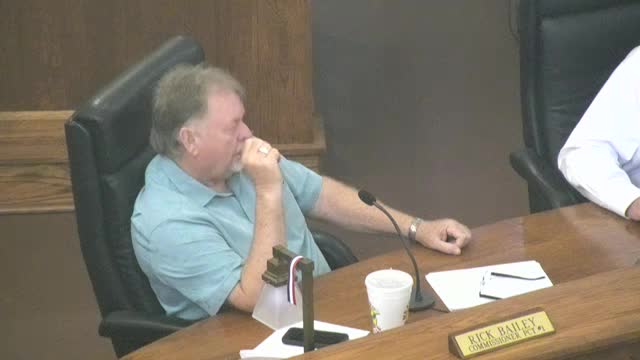County Officials Debate Constable Salary Adjustments Amid Budget Concerns
August 06, 2025 | Johnson County, Texas
This article was created by AI summarizing key points discussed. AI makes mistakes, so for full details and context, please refer to the video of the full meeting. Please report any errors so we can fix them. Report an error »

Johnson County officials are grappling with significant budgetary decisions that could reshape compensation structures for elected constables and their deputies. During a recent Special Commissioner's Court meeting, concerns were raised about proposed salary increases that could reach as high as $33,000 for some elected officials, prompting a heated discussion about fiscal responsibility and the implications for public service.
One commissioner expressed apprehension about the precedent being set by such substantial raises, emphasizing the need to respect taxpayer dollars and the existing salary structures within law enforcement. The commissioner highlighted that the proposed increases could lead to dissatisfaction among employees and questioned the rationale behind elevating salaries to levels that could surpass those of entire deputy positions.
The conversation also touched on the importance of maintaining a clear hierarchy within law enforcement roles. A constable argued for a salary structure that reflects the responsibilities and liabilities of their position, suggesting that constables should be compensated above their deputies to acknowledge their supervisory roles. This call for equity in pay was met with mixed reactions, as some officials pointed out the need for practical solutions that align with budget constraints.
As the court deliberated, it became evident that the proposed salary adjustments would require careful consideration of funding sources and the potential impact on the overall budget. The discussion underscored the complexities of balancing fair compensation for law enforcement officials while ensuring fiscal prudence in the face of rising costs.
Moving forward, the court will need to navigate these challenges thoughtfully, as the decisions made will not only affect the salaries of elected officials but also set a precedent for future budgetary practices in Johnson County. The implications of these discussions will resonate throughout the community, highlighting the ongoing dialogue about the value of public service and the financial realities of government operations.
One commissioner expressed apprehension about the precedent being set by such substantial raises, emphasizing the need to respect taxpayer dollars and the existing salary structures within law enforcement. The commissioner highlighted that the proposed increases could lead to dissatisfaction among employees and questioned the rationale behind elevating salaries to levels that could surpass those of entire deputy positions.
The conversation also touched on the importance of maintaining a clear hierarchy within law enforcement roles. A constable argued for a salary structure that reflects the responsibilities and liabilities of their position, suggesting that constables should be compensated above their deputies to acknowledge their supervisory roles. This call for equity in pay was met with mixed reactions, as some officials pointed out the need for practical solutions that align with budget constraints.
As the court deliberated, it became evident that the proposed salary adjustments would require careful consideration of funding sources and the potential impact on the overall budget. The discussion underscored the complexities of balancing fair compensation for law enforcement officials while ensuring fiscal prudence in the face of rising costs.
Moving forward, the court will need to navigate these challenges thoughtfully, as the decisions made will not only affect the salaries of elected officials but also set a precedent for future budgetary practices in Johnson County. The implications of these discussions will resonate throughout the community, highlighting the ongoing dialogue about the value of public service and the financial realities of government operations.
View full meeting
This article is based on a recent meeting—watch the full video and explore the complete transcript for deeper insights into the discussion.
View full meeting
